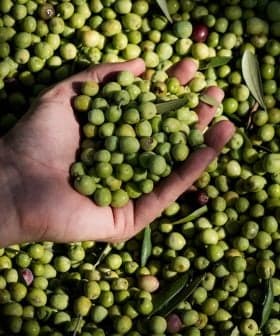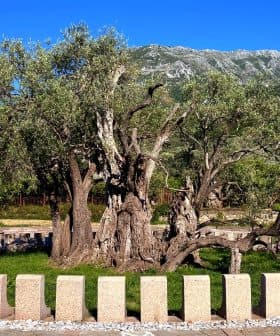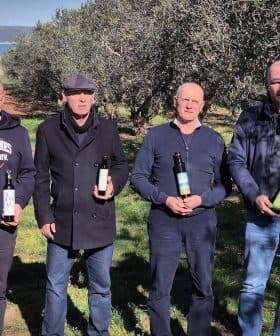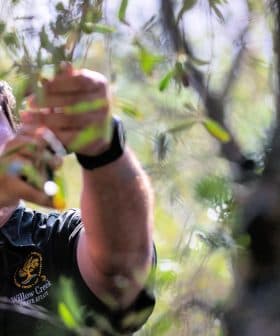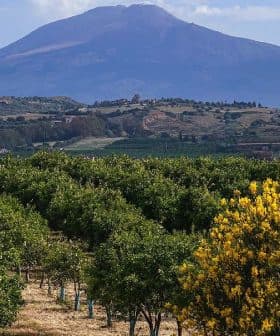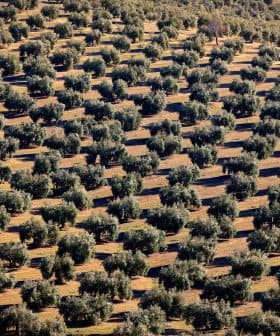Quality and Tradition at Valpaços
The Cooperativa de Olivicultores de Valpacos, one of the most renowned Portuguese producers, has over 2,200 associates from the town of Valpaços and neighboring Mirandela.
 Olive groves near Valpaços (14)
Olive groves near Valpaços (14)The Valpaços cooperative in Trás-os-Montes, Portugal, is one of the largest olive oil producers in the country, focusing on high-quality production and winning awards at international competitions. Director General José Ventura has worked for the cooperative for over 25 years, emphasizing the importance of harvesting olives at the right moment for optimal quality and taste.
The countryside around Valpaços is one of gently rolling hills with alternating patches of pine forests, cork oaks, olives, almonds and figs. This is the quintessential landscape of Trás-os-Montes, a mainly rural region in the interior of Northwest Portugal which is the second-largest olive oil-producing region of the country, only after Alentejo.
José Ventura, director general of the olive growers’ cooperative of Valpaços, showed an Olive Oil Times reporter the olive groves surrounding the village.
Ventura has been working in this cooperative, one of the largest in Portugal, for over 25 years.
“I started almost out of necessity. My parents didn’t have the means for me to study, so I worked for the cooperative and studied at the same time”, he said, as he drove to Fonte Merce, one of the little villages taking their olives to the cooperative.
“Once I entered the world of olive oil, I became passionate about it.”
The Valpaços cooperative was founded in 1952 with just 28 members.
Now, almost seven decades later, it has over 2,200 associates from the town of Valpaços and neighboring Mirandela and produces over 2 million liters of oil each year.
Despite those big figures, the cooperative has managed to combine high-quality production, becoming one of the most renowned Portuguese producers.
This year they won two Gold Awards and two Silver Awards at the NYIOOC World Olive Oil Competition, the most recent recognition that added to several prizes obtained in previous editions of the contest.
Producing high-quality olive oil has no secrets, Ventura pointed out. But harvesting at the right moment, when the fruit is at the right stage of ripening, is key.
It may seem easy. However, bringing together such a large cooperative to this point has not been a straightforward task.
“There was a resistance among some members to harvest olives at early stages as they thought that harvesting later, when they are ripe, would increase their performance,” he recalled.
In order to change people’s minds about the right moment to harvest and improve quality, the cooperative pioneered a measure in Portugal some 15 years ago: “We put in place a system of rewards for those associated farmers who harvest at the beginning of the season. Those who harvest early, get a bonus of 80 cents per kilo,” Ventura explained. “The number of people joining to the early harvest steadily increased.”
Portugal, with a production of 132,000 tons of olive oil last year, is the seventh largest producer after Spain, Italy, Greece, Tunis, Turkey and Morocco, according to data from the International Olive Oil Council.
Valpaços, a town with a population of about 16,000, is at the hinge between the Terras Quentes (hot lands) and the Terras Frias (cold lands) of Trás-os-Montes. “From here to the South, olive trees and other fruit trees are grown. To the North, there are some fruit trees as well, but they mainly grow chestnuts.” Ventura explains.
Unlike other olive oil-producing regions in Portugal, where intensive irrigated olive groves have been planted in recent years, most of the farms in this area are still traditional ones, keeping a distance of six meters between every tree.
“Being able to preserve and maintain traditional, non-irrigated olive groves is key to making a difference in terms of quality. This, and our local cultivars, are the key features that give our olive oil its special taste,” Ventura said, showing how centuries-old olive trees mix with recently planted ones.
As in the rest of the Trás-os-Montes region, Cobrançosa, Madural and Verdeal Transmontana are the main cultivars grown in Valpaços.
“We keep doing the new plantations the same way they used to be done five centuries ago,” Ventura said.
“In intensive olive groves, costs are small compared to here. Although some of the harvest is done with mechanical means, large parts of it are still done manually and costs are higher. We seek quality. We can never compete in terms of quantity with other regions.”
“So we need to preserve the traditional non-irrigated olive groves. That is my call and my passion.”









